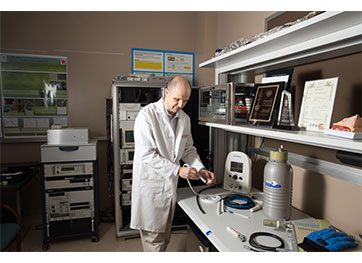Endomag Among Finalists for 2015 Royal Academy of Engineering MacRobert Award
A University of Houston and University College London startup company has been selected as a finalist for the 2015 Royal Academy of Engineering MacRobert Award, the UK’s premier prize for engineering pioneers.
 Co-founded in the UK by Audrius Brazdeikis, a research associate professor of physics
with the Texas Center for Superconductivity at UH, cancer care company Endomag was
chosen for its medical device system that is improving the diagnosis of the spread
of breast cancer for patients. Synonymous with spotting the ‘next big thing’ in the
technology sector, the MacRobert Award is the UK’s longest running national prize
for engineering innovation. Since 1969, the award has identified world-changing innovations
with tangible societal benefits and proven commercial success.
Co-founded in the UK by Audrius Brazdeikis, a research associate professor of physics
with the Texas Center for Superconductivity at UH, cancer care company Endomag was
chosen for its medical device system that is improving the diagnosis of the spread
of breast cancer for patients. Synonymous with spotting the ‘next big thing’ in the
technology sector, the MacRobert Award is the UK’s longest running national prize
for engineering innovation. Since 1969, the award has identified world-changing innovations
with tangible societal benefits and proven commercial success.
Based in Cambridge, Endomag pioneered a new breast cancer diagnostic tool that avoids the use of radioactive tracers in determining the spread of cancer through the lymphatic system. The Sentimag probe developed by Endomag identifies sentinel lymph nodes for removal by detecting a magnetic, rather than radioactive, tracer signal.
“The current standard of care in breast cancer surgery demands that a sentinel lymph node biopsy be performed. The procedure is traditionally guided by injections of radioisotope tracers and use of a gamma probe to locate the lymph node with the highest radioactivity,” Brazdeikis said. “Our collaborative research effort has resulted in developing a handheld magnetic probe that can be used in conjunction with a magnetic tracer to locate the sentinel lymph node quickly and easily for biopsy in breast cancer patients.”
A highly sensitive instrument, Sentimag and its associated Sienna+ tracer combine nanotechnology and advanced magnetic sensors, removing the need for radiation, speeding up the process and putting the detection of the sentinel lymph node directly in the hands of surgeons.
“The Sentimag enables intraoperative, real-time localization of the sentinel lymph node, which is the first lymph node to which a tumor’s metastasizing cancer cells drain, as well as being the most likely to harbor metastases that can also spread to other parts of the body,” Brazdeikis said. “The system’s technology is not limited only to breast cancer and is already being used for other cancer indications, such as melanoma, prostate and thyroid. Other potential indications include lung and colorectal cancer staging.”
In contrast to radioactive tracers, Brazdeikis adds, the Sienna+ magnetic tracer is safe, easily stored and has a long shelf life. Additionally, there are no staff safety issues, supply problems or difficulties associated with the disposal of radioactive waste.
The device is now sold in 18 European countries, and more than 6,000 patients have undergone surgery guided by the Sentimag technology. Endomag started clinical trials in the U.S. under an Investigational Device Exemption in January 2015 at five medical centers in Texas, Pennsylvania and California. The 180-patient study aims to provide further clinical evidence that technology is as safe and effective as the current standard of care with U.S. patients.
“With two of our clinical trial sites in Texas and our University of Houston roots, establishing our first U.S. office in Texas was a natural decision,” said Eric Mayes, CEO of Endomag. “From our strong cross-Atlantic foundations, we expect to build a significant commercial presence in Texas to help bring a better standard of care for all across the U.S.”
Endomag was co-founded by Brazdeikis, Quentin Pankhurst and Simon Hattersley. As a MacRobert Award finalist, the Endomag team is competing for a gold medal and a cash prize of £50,000, which is the equivalent of about $77,500. The winner will be announced July 16 at the Academy’s annual awards dinner in London.
- Lisa Merkl, University Media Relations